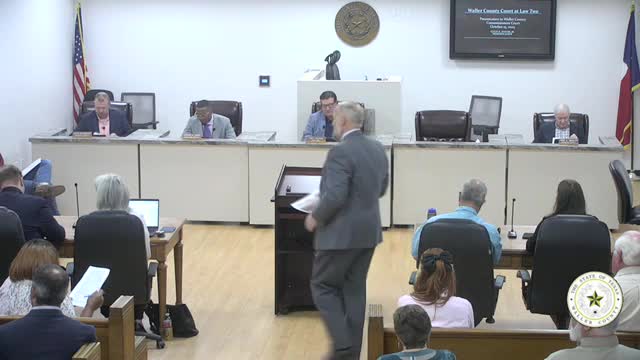Waller County judge says new hybrid court cleared most civil backlog but criminal caseload now strains system
Get AI-powered insights, summaries, and transcripts
Subscribe
Summary
Judge Elton Mathis told the Waller County Commissioners Court on Wednesday that Waller County Court at Law No. 2—created by the Texas Legislature in 2023—has resolved most of the county’s civil backlog but is now struggling under a surge of criminal cases that threatens earlier progress.
Judge Elton Mathis told the Waller County Commissioners Court on Wednesday that Waller County Court at Law No. 2—created by the Texas Legislature in 2023—has resolved most of the county’s civil backlog but is now struggling under a surge of criminal cases that threatens earlier progress.
Mathis, the court’s first appointed and later elected judge, said the hybrid court resolved roughly 97% of the civil, probate and family backlog it inherited from Sept. 2023, and disposed of 90% of the district-court civil backlog assigned to it. But he told commissioners the criminal docket has not recovered: since Jan. 1, 2025 he reported roughly 1,150 new misdemeanor cases assigned to his court and only about 12–20% of those have been resolved in the eight months since most criminal work began arriving there.
The judge said county-level criminal matters remain “in intensive care.” He told commissioners the court resolved 66% of the total backlog he received across courts in two years but that the pace of new misdemeanors and felonies has effectively erased much of the progress. Mathis said he has received roughly 125 felony matters since January and had resolved about 10, and that backlog dynamics are again producing long waits for trials. “Just the volume of new misdemeanor cases filed since 01/01/2025 completely wipes away the progress of this court working two years to reduce the prior existing backlog,” he said.
Why it matters: Mathis said a sustained criminal backlog undermines public safety and the rule of law by delaying indictments, grand juries and trials; he warned commissioners that the county must weigh investments in facilities, magistrate and defense capacity, and other resources now to avoid becoming like larger, more troubled jurisdictions. He urged the court to prioritize courtroom space near the jail, increased public-safety coordination and more defense attorneys and associate-judge resources to triage work.
Details and context: Mathis described the court’s jurisdictional design as hybrid—able to hear many civil, probate and family matters as well as most felonies (excluding capital murder and select district-only matters)—and said the legislature and local officials created the court to address severe delays after the COVID-19 period. He said over the two-year period the court resolved 99% of a civil backlog that dated as far back as 2006, resolved 95% of new probate cases and achieved an 84% resolution rate for new family-law filings. By contrast, misdemeanor resolution has lagged (roughly 40–45% of the initial misdemeanor backlog closed in several months, but new filings since January represent an order-of-magnitude increase).
Asked by commissioners what the court needs, Mathis listed: a courtroom near the jail to avoid prisoner transports; additional defense attorneys and court coordinators; funding for visiting court reporters and other court staff; and an associate judge to help with magistrate duties and caseflow. Commissioners and other county judges agreed and described ongoing coordination with state legislators and local municipalities to pursue facility and operational solutions. Commissioner comments noted tradeoffs in county budgeting and urged public conversations about potential funding options.
What remained unresolved: Mathis stressed the court does not seek to assign blame but said the county faces a choice about investments in justice infrastructure. He declined to propose specific funding amounts in the presentation but said he would return with more concrete needs. County officials asked about legislative remedies—such as seeking an additional bench funded by the state—versus local investments in courtrooms and staffing.
Ending: Mathis said he would continue to update the Commissioners Court as the court implements short-term remedies and pursues longer-term facility solutions. He closed by reminding the panel that delays in the criminal docket have long-range consequences for victims, defendants and community safety.
